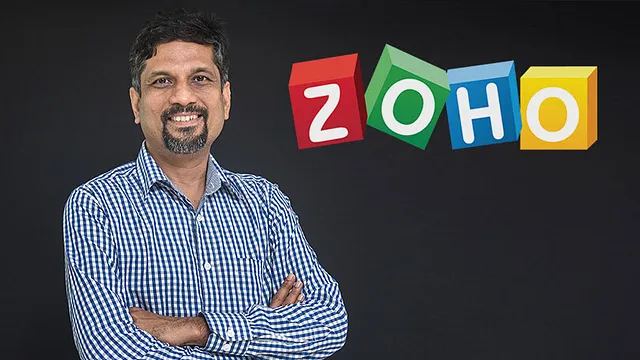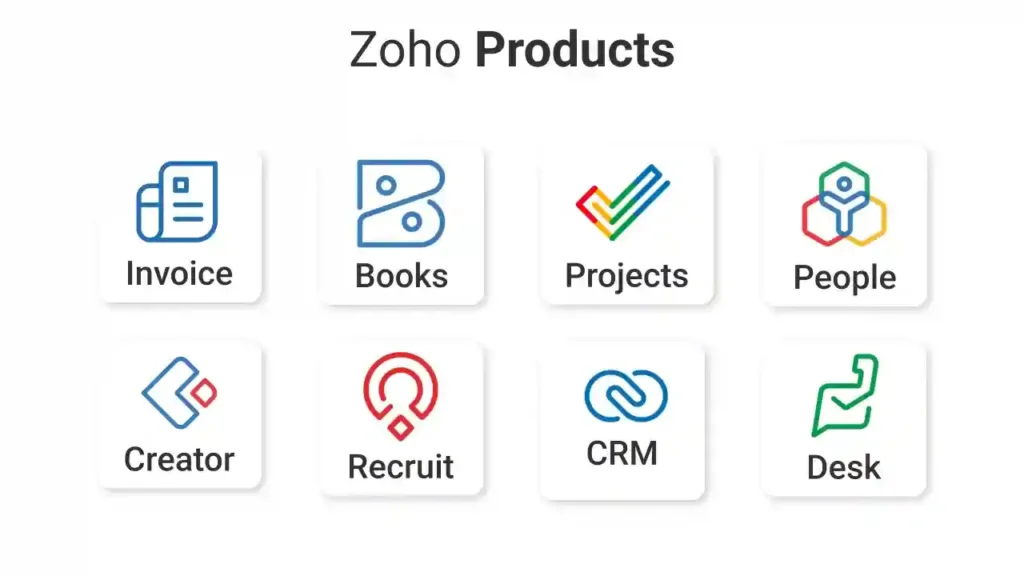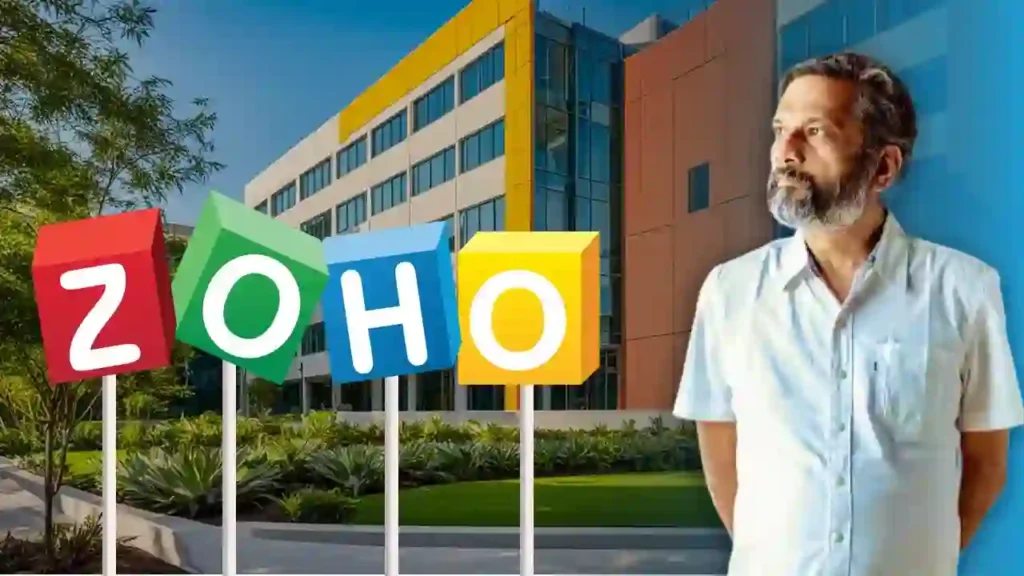Startup is becoming a new craze in developing countries like India, where young entrepreneurs are taking loans and funding for their companies and struggle to build something that is product market fit. They are pitching their ideas to angel investors, build the product and launch in market, but most of them don’t survive in market and closed within 5 years of its launch.
Meet Sridhar Vembu, the visionary founder of Zoho, who has created a remarkable success story without relying on loans or external investors. Coming from a humble village in Tamil Nadu, his journey is a example to the power of perseverance, innovation, and a deep commitment to creating value for customers.
While many Indian startups chase quick profits and external funding, it has defied the odds, achieving a staggering profit of ₹2,700 crores and serving over 6 crore customers across 180 countries. With a valuation of ₹40,000 crores, it has become an example of success in a India Startup ecosystem where 77 out of 114 Indian unicorns are still struggling to turn a profit.
Table of Contents
Zoho Case Study: From Startup to Unicorn
In this blog post, we will dive into the key lessons from Sridhar Vembu’s journey with his company. From embracing challenges to building innovation, his insights offer invaluable guidance for aspiring entrepreneurs and established business leaders alike.
Background of Sridhar Vembu
His journey from a small village in Tamil Nadu to becoming the founder of Zoho is nothing short of inspiring.

Born into a farming family, Vembu’s early life was rooted in simplicity. His father later moved the family to Chennai, where he worked as a stenographer in the High Court.
Despite these humble beginnings, Vembu’s academic brilliancy shone through when he secured an impressive 27th rank in the All India JEE, earning him a spot at IIT Madras. At IIT, Vembu pursued electrical engineering with dreams of creating groundbreaking technology.
However, he soon found that the curriculum did not satisfy his thirst for deeper knowledge. This realization pushed him to Princeton University, where he earned his PhD.
Yet, even at such a prestigious institution, he felt unfulfilled, leading him to take charge of his own learning. Vembu immersed himself in self-study, exploring topics that truly sparked his interest.
After completing his education, he took a job at a reputable company but felt a strong urge to make a meaningful impact in India.
In 1996, alongside his brother, he founded AdventNet, aiming to create jobs and contribute to the country’s tech landscape. Their journey began in a modest room with just two computers, but Vembu’s vision and relentless drive laid the foundation for what would become one of India’s most profitable companies.
Sridhar Vembu’s story is a powerful reminder that success is often born from humble beginnings, a passion for learning, and a commitment to making a difference.
How Zoho achieved profitability without Investment
Unlike many startups that rely heavily on loans and investors for their growth, Zoho has found out its path to profitability through careful cash management and self-sustainability.
From the outset, Vembu and his brother (Kumar Vembu) made a conscious decision to bootstrap their company, AdventNet, using their own savings.
This approach not only instilled a sense of financial discipline but also build a culture of innovation and independence.
While many startups chase after venture capital, often leading to unsustainable growth patterns, it’s model stands in stark contrast. The company has consistently prioritized profitability over rapid expansion.
By focusing on generating revenue from the start, it has built a solid foundation that has allowed it to thrive even in challenging economic conditions. In fact, while 77 out of 114 Indian unicorns are still struggling to turn a profit, it has reported impressive earnings, generating profits of ₹2,700 crores.
Innovative Marketing Strategies and Breakthroughs
Zoho never did its marketing as other companies do.
Instead of burning cash into flashy advertising campaigns, Vembu focused on what truly matters: product quality. From the very beginning, it prioritized creating robust, reliable software that met the needs of its users.
By delivering high-quality products, it cultivated a loyal customer base that spread the word about their experiences. Satisfied users became advocates, sharing their positive experiences with others and effectively acting as the company’s marketing team.
Also Read: 20 Explosive Growth Marketing Strategies that Ignite your Revenue
Another aspect of Zoho’s marketing strategy is Vembu’s decision to maintain a low profile. In an industry where many companies seek the spotlight, he chose to operate quietly, allowing room for experimentation without the fear of public scrutiny.
It provided the freedom to innovate and iterate on products without the pressure of immediate success or failure.
The breakthrough moment came in the late 1990s when the company, originally known as AdventNet, showcased its software at an exhibition. This event marked a turning point for Sridhar Vembu and his team, as they caught the attention of Japanese clients seeking affordable alternatives to expensive software solutions from larger competitors like HP.
These clients were frustrated with the high costs associated with big-name software, and they saw potential in AdventNet’s offerings.
Recognizing this opportunity, Vembu and his team shifted their focus from hardware to software, tailoring their products to meet the specific needs of small and medium-sized businesses.
They understood that while larger companies were creating sophisticated software for big clients, there was a significant gap in the market for affordable, high-quality solutions for smaller enterprises.
This insight allowed them to position their software as a cost-effective alternative, opening the door to a broader customer base. In 1998, this strategic pivot paid off when AdventNet secured a substantial order, pushing their revenue to $1 million —an impressive feat for a startup just two years old.
Adapting to Challenges
The dot-com bust of 2000 was a pivotal moment for it, then known as AdventNet, as it faced a significant crisis when 80% of its clients vanished almost overnight.
This unexpected loss could have been a big problem for the new company, but his guidance changed this challenge into a chance for growth.
Vembu chose not to panic and instead decided to invest a lot in research and development during this difficult time. He realized that while other companies were reducing their spending, this was the ideal opportunity to be innovative.
With a dedicated team of 115 engineers, he encouraged his employees to focus on developing new products and enhancing existing ones. This led to the creation of ManageEngine, a suite of IT management tools that quickly gained traction in the market.
The emphasis on R&D not only kept the team engaged but also positioned Zoho to meet the evolving needs of its customers.
At the same time, he saw the opportunity in cloud computing, which was starting to become a feasible business model. This realization led to the creation of Zoho, a full set of cloud-based tools made for small and medium-sized companies.
By offering high-quality software at competitive prices, it filled a significant gap in the market, catering to clients who were often overlooked by larger companies.
The combination of strategic investment in R&D and the launch of innovative products like ManageEngine and Zoho itself allowed the company to emerge from the dot-com bust stronger than ever.
Strategic Pricing and Product Development
Sridhar Vembu’s smart pricing and product development have been key to it’s success, especially with his “Classic Geoarbitrage Play.”
This method takes advantage of lower costs in India while selling software in more expensive markets like the United States. By hiring talented engineers in India, where wages are much lower, Zoho can provide high-quality software at affordable prices.
This strategy helps small and medium-sized businesses access their products and makes Zoho a strong competitor against larger companies that have higher prices.
It’s strategy includes the use of the freemium model. This means that potential customers can use their software for free for a limited time, which makes it easier for them to try it out.

This helps build trust and encourages users to explore all the features before deciding to buy.
For example, businesses can start with basic functions and then upgrade to more comprehensive packages as they need them. This model has been successful in attracting a wide range of customers because it lets them experience the value of it’s products without having to spend any money at first.
Zoho’s strategy is deeply rooted in continuous product innovation. The company regularly introduces new products that enhance its existing offerings, forming a cohesive ecosystem of applications.
For instance, a customer who appreciates it’s CRM software may be more likely to explore other tools such as Zoho Books for accounting or Zoho Projects for project management.
This interconnected approach not only boosts customer satisfaction but also drives overall sales, as users discover more reasons to remain within it’s ecosystem.
By implementing smart pricing strategies, creative business models, and focusing on product improvement, Zoho has become a top player in the software field, proving that careful planning can lead to great success in a tough market.
Lessons Learned from Zoho’s Journey
Sridhar Vembu’s journey with Zoho offers invaluable lessons for aspiring entrepreneurs and business leaders alike.
1. knowledge beyond textbooks:
One of the most important lessons learned is the value of knowledge that goes beyond what is found in textbooks. Vembu’s own experiences show that real learning often takes place outside of traditional educational environments.
Despite his impressive academic achievements, including a PhD from Princeton, he discovered that the curriculum did not satisfy his desire for deeper knowledge. This realization motivated him to pursue a path of self-directed learning, delving into subjects that truly aligns with his passion.
He recognized that while formal education lays a strong foundation, it is the curiosity and openness to explore beyond the prescribed curriculum that often lead to innovative solutions and personal development.
2. hiring skilled individuals:
Another key lesson from Zoho’s journey is the value of hiring skilled individuals for various business functions. He recognized that technical expertise alone is insufficient for running a successful business.
By hiring professionals with expertise in sales, finance, and management, he was able to build a well-rounded team that complemented his own strengths. This strategic move allowed him to focus on product development while his team handled the critical aspects of running a company.
3. Embracing change and flexibility:
When faced with the dot-com bust in 2000, which saw 80% of Zoho’s clients disappear overnight, he could have panicked or resorted to drastic measures. Instead, he saw it as an opportunity to invest in research and development, recognizing that tough times often present the best chance for innovation and growth.
By adapting to the changing market conditions and continuously launching new products to complement existing ones, Zoho has maintained its competitive edge.
He understood that in the fast-paced world of technology, rigidity can be a reason for failure, and embracing change is the key to staying ahead of the curve.
His experience at Zoho demonstrates the importance of curiosity, flexibility, and strategic planning. By valuing practical knowledge, hiring a skilled team, and being open to change, it has achieved success without needing outside financial support.
These lessons offer a blueprint for aspiring entrepreneurs looking to build sustainable and profitable businesses in an ever-evolving landscape.
Also Read: Stop Saying “I Want to Start a Business But Have No Ideas”: Do It in 8 Easy Steps
Conclusion:
Sridhar Vembu’s journey with Zoho is a fantastic example of what it means to stick with your dreams, embrace new ideas, and stay true to your vision. By focusing on sustainable growth, being financially savvy, and ensuring top-notch products rather than chasing quick cash from investors, he has successfully created a thriving company.
The achievements of Zoho highlight how important it is to be flexible, think strategically, and be open to trying new things. His ability to turn challenges into opportunities, whether during the dot-com crash or while launching exciting new products, inspires many aspiring entrepreneurs and business leaders.
By valuing knowledge, building diverse teams, and embracing change, we can create companies that truly make a difference. His story reminds us all that with a clear vision, determination, and a smart approach, amazing things can happen!

